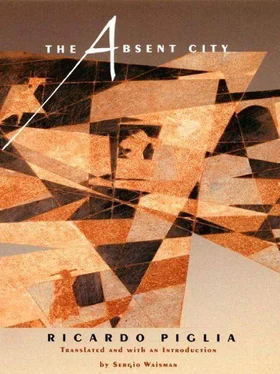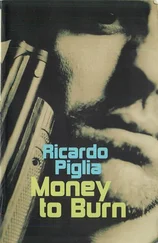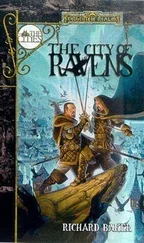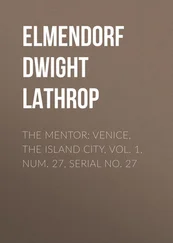“It’s done, kid,” he said to Burgos; “tonight we’re having barbecued fish for dinner.” Everyone broke out in loud laughter, and for the first time in a long time Burgos felt the respect and the comradeship of the men.
Macedonio was always gathering strange stories. Even when he was a treasurer in the Province of Misiones, he was already compiling anecdotes and stories. “Stories have simple hearts, just like women. Or men. But I prefer to say women,” Macedonio would say, “because it makes me think of Scheherazade.” It was not until much later, Junior thought, that they understood what he was trying to say. Around that time Macedonio had lost his wife, Elena Obieta, and everything that Macedonio did since then (and especially the machine) was meant to make her seem present. She was the Eternal One, the river of stories, the endless voice that kept memory alive. He never accepted the fact that he had lost her. In this he was like Dante. And, like Dante, he built a world in which he could live with her. The machine was that world, it was his masterpiece. He got her out of nowhere and kept her covered with a blanket on the floor of a closet in the room of a boardinghouse around Tribunales, near the courthouse. The system was simple, he had hit on it by accident. When it transformed “William Wilson” into the story of Stephen Stevensen, Macedonio realized that he had the basic elements from which he could build a virtual reality. So he began working with series and variables. First he thought about the English railroads and the reading of novels. The genre grew in the nineteenth century, it was tied in with the mode of transportation. That is why so many stories take place on trains. People liked to read stories about a train while they rode aboard a train. In Argentina, the first train ride in a novel is clearly found in the work of Cambaceres.
In one of the rooms of the Museum Junior saw the train car in which Erdosain had killed himself. It was dark green, bloodstains could be seen on one of the leather seats, the windows were open. In the other room he saw the photograph of a train car that belonged to the old Ferrocarril Central Argentino. That was the car in which the woman who fled at dawn traveled. Junior imagined her nodding off in her seat, the train cutting through the darkness of the country, all its windows lit up. That was one of the first stories.
She had a two-year-old son but decided to abandon him. She tied him with a long belt to a hoop on the ceiling and left him crawling around in the room on a waterproof rug. She took the precaution of moving the furniture and piling it up against the walls, far from the child’s reach, so it would be like an empty room. She wrote a note to the cleaning woman, telling her she had gone out to run an errand. It was seven in the morning. The moment her husband drove off to work in his car, she called a taxi and took the first long-distance train out of Retiro Station. The next day she was in a small town on the border of the Province of San Luis. In the hotel she signed in under her mother’s name (Lía Matra). She spent the day sleeping and at night went down to gamble in the casino. The roulette was like the face of fortune. The men and women in the hall went there looking for answers, each in an isolated microscopic universe. (Those funereal croupiers, she thought, she would have liked to take one of them to bed with her.) It was a poor casino, with light-blue carpeting. She imagined that Hell must have the same decor. A half empty and poorly lit room, with an “electric” blue moquette. The men wore jackets, the women looked like retired bar girls. A cloud of insects buzzing around an artificial replica of passion and life. The woman thought of days or months and played them in progression and always won. When the casino closed they gave her the money she had won in a paper bag. She had to cross a plaza in order to get back to the hotel. There was a statue, benches, a garbage can chained to a tree. She was going to call home and let them know she had left. The woman hides the bag with the money in the bushes. The town is empty, a light shines in the distance where the old train station used to be. The woman crosses the street, goes up to her room, and only then decides to unpack her suitcase. She hangs her clothes up in the closet, arranges her bottles and creams in the cabinet in the restroom, closes the windows so the daylight will not come in. Calls down to the front desk, asks not to be disturbed, then kills herself.
The room in which the woman committed suicide was reproduced in the Museum. Junior saw the picture of the son against the lamp on the night table. He did not remember this detail from the story. The series of hotel rooms was reproduced in successive halls. The boardinghouse in which an old man sat on a wicker chair and plucked at a guitar through the night. The washbasin on the iron base in which a German soldier’s lover had washed her hair. Junior saw the hotel room from Cuernavaca, the bed surrounded by a mosquito netting and a bottle of tequila. In another hall to the side was the room from the Majestic and the armoire in which the woman had looked for the bottle of perfume. He was astonished by the precision of the reconstruction. It seemed like a dream. But dreams were false stories. And these were true stories. Each one isolated in a corner of the Museum, building the story of their lives. Everything was as it should be. Military uniforms in tall glass cases, Moreira’s long dagger on a black velvet pillow, the photograph of a laboratory in one of the islands of the Tigre Delta. The stories were developed from these objects. They were crisp and clear as memories. The last room contained the mirror, and in the mirror was the first love story.
I fell in love for the first time when I was twelve years old. A redhead showed up in the middle of the school year. The teacher introduced her as the new student. She was standing next to the blackboard, her name was (or is) Clara Schultz. I do not remember anything from the weeks that followed, but I do know that we fell in love, and that we tried to hide it because we knew we were too young and that what we wanted was impossible. Some of the memories still hurt now. The others would look at us when we stood in line together, and she would turn even redder, and I learned what it meant to suffer the complicity of those fools. I got into fights after school in the small soccer field on Amenedo with guys from the fifth and sixth grades who used to follow her around and throw thistles in her hair — just because she wore it loose and it came down to her waist. One afternoon, I came home so beat up that my mother thought that I must have been crazy, or that I had contracted some kind of suicidal fever. I could not tell anyone what I was feeling. I looked surly and sullen, as if I were always tired. We wrote each other letters, although we barely knew how to write. I remember living through an unstable succession of feelings that alternated between ecstasy and desperation. I remember that she was serious and passionate and that she never smiled, perhaps because she knew what the future held in store for us. I do not have any photographs of her, only my memories, but Clara has been present in every woman I have ever loved. She left just as she had arrived, unexpectedly, before the end of the year. One afternoon she did something heroic. Breaking all the rules, she came running into the boys patio, which was forbidden to girls, to tell me that they were taking her away. I can still see the two of us standing on the red bricks of the patio, the others in a circle around us, looking on sarcastically. Her father was a municipal inspector or a manager in a bank and was being transferred to Sierra de la Ventana. I remember the horror that the image of a sierra that was also a jail produced in me. That is why she had arrived in the middle of the school year, and perhaps also why she had loved me. My pain was more than I could stand, but I managed to remember that my mother used to say that if you loved someone you should put a mirror under your pillow, and that if you saw that person reflected in your dreams, it meant you would get married. At night, when everyone at home had gone to sleep, I would walk barefoot to the back patio and take the mirror in which my father shaved every morning off the hook. It was a square mirror, with a brown wooden frame, and a small chain in the back from where it hung on a nail in the wall. I would sleep and wake up frequently at night, trying to see her reflection when I dreamt. At times I imagined that I saw her beginning to appear in the corner of the mirror. One night, many years later, I dreamt that I was dreaming with her in the mirror. I saw her just as she was when she was a girl, with her red hair and her serious eyes. I was completely different, but she was the same, and she was walking toward me, as if she were my daughter.
Читать дальше












